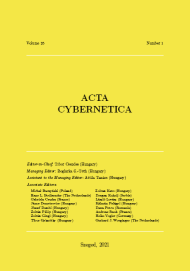Identification of Multi-Faults in GNSS Signals using RSIVIA under Dual Constellation
DOI:
https://doi.org/10.14232/actacyb.285315Keywords:
RSIVIA, RAIM, GNSS, fault detection and identification, Kalman FilterAbstract
This publication presents the development of integrity monitoring and fault detection and exclusion (FDE) of pseudorange measurements, which are used to aid a tightly-coupled navigation filter. This filter is based on an inertial measurement unit (IMU) and is aided by signals of global navigation satellite system (GNSS). Particularly, the GNSS signals include global positioning system (GPS) and Galileo. By using GNSS signals, navigation systems suffer from signal interferences resulting in large pseudorange errors. Further, a higher number of satellites with dual-constellation increases the possibility that satellite observations contain multiple faults. In order to ensure integrity and accuracy of the filter solution, it is crucial to provide sufficient fault-free GNSS measurements for the navigation filter. For this purpose, a new hybrid strategy is applied, combining conventional receiver autonomous integrity monitoring (RAIM) and innovative robust set inversion via interval analysis (RSIVIA). To further improve the performance, as well as the computational efficiency of the algorithm, the estimated velocity and its variance from the navigation filter is used to reduce the size of the RSIVIA initial box. The designed approach is evaluated with recorded data from an extensive real-world measurement campaign, which has been carried out in GATE Berchtesgaden, Germany. In GATE, up to six Galileo satellites in orbit can be simulated. Further, the signals of simulated Galileo satellites can be manipulated to provide faulty GNSS measurements, such that the fault detection and identification (FDI) capability can be validated. The results show that the designed approach is able to identify the generated faulty GNSS observables correctly and improve the accuracy of the navigation solution. Compared with traditional RSIVIA, the designed new approach provides a more timely fault identification and is more computational efficient.







